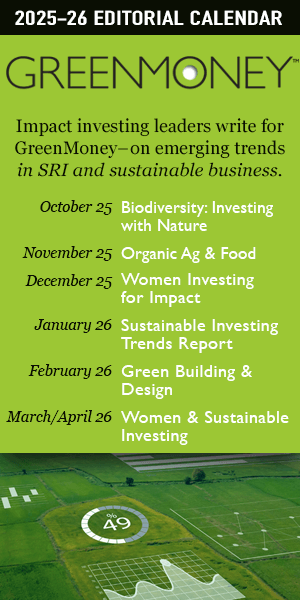 By Madalyn Metzger,
By Madalyn Metzger,
Everence Financial and Praxis Mutual Funds
The goal of most investors is to achieve a positive return – with success typically measured in annualized percentages. And while this is an important measure, a growing number of investors are looking for more. Specifically, they’re looking for ways their investments can make a difference, and improve the quality of life in their communities and around the world.
That’s where green bonds come in. First introduced by the World Bank in 2008, green bonds (also known as qualified green building and sustainable design project bonds) are designed to help investors make a positive impact on environmental projects through their investment portfolios.
The market for green bonds has picked up steam over the years. Since their introduction, the World Bank has issued approximately $3.5 billion in green bonds. And while they’re somewhat new to the scene, green bonds make complete sense to Praxis Mutual Funds, a faith- and values-based fund family advised by Everence Capital Management.
Praxis approaches its investment strategy through stewardship investing, a philosophy of financial decision making that balances social and financial considerations and is motivated and informed by the fund family’s faith convictions. This focus is driven by the company’s core values, which include the need to respect the dignity and value of all people, demonstrate a concern for justice in a global society and work toward environmental sustainability.
“At Praxis, we want to do our part to transform our world,” said David C. Gautsche, President of Praxis Mutual Funds. “Our investment philosophy consists of company selection, shareholder advocacy and community development investment. Our core values embrace a wide range of environmental, social and governance concerns, as well as traditional, prudent financial considerations.”
Praxis applies this strategy to all of its five mutual funds – but it is especially notable in the Praxis Intermediate Income portfolio, which includes more than 10 percent of green bonds and other high social impact bonds. In addition, the Praxis Genesis Portfolios (three diversified funds-of-funds celebrating their third anniversary this year) include the Praxis Intermediate Income Fund in their portfolio mix.
Making a High Social Impact Through Bonds
When it comes to stocks, it’s easy for investors to see how they can have a positive social impact by including progressive companies in their portfolios and/or utilizing shareholder advocacy to help goad companies to better social and environmental performance.
Fixed-income investors, on the other hand, can’t make a positive impact in the same way, because they don’t have company ownership. And because many of those same progressive companies are young and small, they likely aren’t borrowing from the public investment grade bond market yet. However, bondholders can help organizations and companies bring down the cost of borrowing at the margin – effectively making an impact in places where a stock portfolio couldn’t. Also, some of these organizations don’t have public stock, and companies borrow for specific energy projects that would not issue equity in the public market.
Since its inception, the Praxis Intermediate Income Fund has screened out companies that don’t match its core values. In the past, it also used a small portion of its portfolio to make a positive impact through solar project bonds and community development investment notes. However, the fund’s investment managers saw how they could make an even bigger social impact in 2006, when they first purchased bonds financing immunization and wind energy. The Great Recession of 2008 and early 2009 put some positive investing plans on hold, but by late 2009, the fund managers became the first socially responsible (SRI) investors in the U.S. to purchase the World Bank green bonds, and added other positive bonds for wind energy and pollution control.
Since then, the Praxis Intermediate Income Fund has purchased a number of green bonds to support renewable energy and environmental projects. For example, the fund has purchased:
• $2.2 million in United States Agency for International Development (USAID) bonds designated for water and wastewater systems in Egypt.
• A $167,000 bond in NextEra Energy Resources to fund multiple wind energy projects operated by FPL Energy National Wind (a subsidiary of NextEra).
• An $800,000 bond purchased in Topaz Solar Farms LLC (a subsidiary of MidAmerican Energy Holdings Company) to construct a major solar farm installation in San Luis Obispo County, Calif.
• A $750,000 bond in the Pelton Round Butte hydro-project, the only hydroelectric project in the U.S. jointly owned by a Native American tribe (the Confederated Tribes of Warm Springs) and a utility (Portland General Electric Company). The agreement protects important Native American cultural resources, and power from the three dams is an important source of income for both partners.
In addition to green project bonds, some of the Praxis Intermediate Income Fund’s recent purchases include a social justice element. For instance, the fund purchased a $1.5 million U.S. Department of Housing and Urban Development (HUD) bond to help support community development and increase access to affordable housing free from discrimination. Another $2.5 million in bonds purchased were for a green apartment complex in Long Island, N.Y., as part of Fannie Mae’s Multifamily Green Initiative. The fund also purchased $1 million in low-income housing bonds issued by the city of Indianapolis, Ind., the proceeds of which are going toward providing financing or financial assistance toward costs of the acquisition, renovation and equipping of an approximately 360-unit multifamily rental housing project.
Most recently, the Praxis Intermediate Income Fund purchased $2 million in the second issue of International Finance Facility for Immunization bonds, funding a program to help save millions of children from preventable diseases. These so-called vaccine bonds provide investors the opportunity to fund immunization programs through the GAVI Alliance, a public-private partnership created to increase access to life-saving vaccines in the world’s poorest countries. The bonds are backed by legally binding donation commitments from governments to the GAVI Alliance.
Part of the Praxis Strategy
So, why does the Praxis Intermediate Income Fund focus such a significant portion of its portfolio on high social impact bonds? The reason is simple, given the fund family’s stewardship investing approach.
“These are just the types of securities we like to have in our portfolio,” explained Benjamin J. Bailey, co-manager of the Praxis Intermediate Income Fund. “We want investments that make both social and financial sense, especially bonds that support renewable energy projects and the human condition.”
Green bonds – such as wind and solar projects – allow the Praxis Intermediate Income Fund to still have a diversified portfolio and get a higher yield. But because these bonds are lower rated, the fund is taking on more risk. This can be stabilized with Aaa-rated World Bank bonds for international projects, where there’s not as much return but little risk.
“This helps us balance out the portfolio,” explained Bailey. “We’re trying to do some different things, such as wind, solar, geothermal, hydroelectric, pollution control, etc. We always want to have diversification, so we’re diversifying among different rates, different risks and different avenues of positive investing and green bonds.”
Looking Ahead
According to Bailey, the popularity of green bonds continues to grow, especially for green projects funded through the World Bank, which supports environmental and sustainability programs in developing countries around the world. Solar projects, specifically, appear to be an area of growth and opportunity – and a way for investors to address climate change in a positive and effective way.
As investor interest in green bonds increases, so does the demand for accountability. Some companies, such as the Center for International Climate and Environmental Research at the University of Oslo, are now certifying green bonds, so investors know the money is going to actual projects – rather than to pay overhead expenses.
In addition, more asset managers are coming into the green bond market on a larger scale, and are coming up with new strategies to offer green bonds to clients. Some speculate this growth will eventually enter the retail investing space, and perhaps begin to resemble the standard bond market.
The developments in the green bond market continue to be a good fit for Praxis Mutual Funds.
“We believe we need to be just as concerned about the impact of our investments on others as we are about the financial returns we receive,” said Gautsche. “Looking ahead, we’re excited about where green bonds and other high social impact investments are heading, and we’re glad to be part of it.”
Article by Madalyn Metzger, Marketing Communication Manager for Praxis Mutual Funds and Everence Financial, based in Goshen, IN. For more information on Praxis Mutual Funds, visit www.praxismutualfunds.com
Bond funds will tend to experience smaller fluctuations in value than stock funds. However, investors in any bond fund should anticipate fluctuations in price, especially for longer-term issues and in environments of rising interest rates.
As of June 30, 2013, the Praxis Intermediate Income Fund had invested 0.58 percent of its assets in IFFIM FRN, (0.68 percent in FNMA DUS, 0.29 percent in Indianapolis Ind. Multifamily HSG REV Meadowlark, 0.33 percent in Warm Springs Reservation ORE Confederated Tribes, 0.55 percent in MidAmerican Energy Company, 0.24 percent in Topaz Solar Farms, 0.08 percent in FPL Energy American Wind, 0.03 percent in FPL Energy National Wind, 0.28 percent in FPL Energy Caithness (Harper Lake Solar), 0.43 percent in U.S. Department of Housing and Urban Development, and 0.63 percent in United States Agency for International Development. Fund holdings are subject to change. To obtain holdings as of the most previous quarter, visit www.praxismutualfunds.com
Consider the fund’s investment objectives, risks and charges and expenses carefully before you invest. The fund’s prospectus and summary prospectus contains this and other information. Call (800) 977-2947 or visit www.praxismutualfunds.com for a prospectus, which you should read carefully before you invest. Praxis Mutual Funds are advised by Everence Capital Management and distributed through FINRA member BHIL Distributors Inc. Investment products offered are not FDIC insured, may lose value and have no bank guarantee.

















